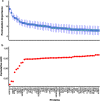Data-independent acquisition mass spectrometry in severe rheumatic heart disease (RHD) identifies a proteomic signature showing ongoing inflammation and effectively classifying RHD cases
- PMID: 35317720
- PMCID: PMC8939134
- DOI: 10.1186/s12014-022-09345-1
Data-independent acquisition mass spectrometry in severe rheumatic heart disease (RHD) identifies a proteomic signature showing ongoing inflammation and effectively classifying RHD cases
Abstract
Background: Rheumatic heart disease (RHD) remains a major source of morbidity and mortality in developing countries. A deeper insight into the pathogenetic mechanisms underlying RHD could provide opportunities for drug repurposing, guide recommendations for secondary penicillin prophylaxis, and/or inform development of near-patient diagnostics.
Methods: We performed quantitative proteomics using Sequential Windowed Acquisition of All Theoretical Fragment Ion Mass Spectrometry (SWATH-MS) to screen protein expression in 215 African patients with severe RHD, and 230 controls. We applied a machine learning (ML) approach to feature selection among the 366 proteins quantifiable in at least 40% of samples, using the Boruta wrapper algorithm. The case-control differences and contribution to Area Under the Receiver Operating Curve (AUC) for each of the 56 proteins identified by the Boruta algorithm were calculated by Logistic Regression adjusted for age, sex and BMI. Biological pathways and functions enriched for proteins were identified using ClueGo pathway analyses.
Results: Adiponectin, complement component C7 and fibulin-1, a component of heart valve matrix, were significantly higher in cases when compared with controls. Ficolin-3, a protein with calcium-independent lectin activity that activates the complement pathway, was lower in cases than controls. The top six biomarkers from the Boruta analyses conferred an AUC of 0.90 indicating excellent discriminatory capacity between RHD cases and controls.
Conclusions: These results support the presence of an ongoing inflammatory response in RHD, at a time when severe valve disease has developed, and distant from previous episodes of acute rheumatic fever. This biomarker signature could have potential utility in recognizing different degrees of ongoing inflammation in RHD patients, which may, in turn, be related to prognostic severity.
Keywords: Adiponectin; Biomarker; Complement component C7; Fibulin-1; Inflammatory response; Rheumatic heart disease.
© 2022. The Author(s).
Conflict of interest statement
The authors declare that they have no competing interests.
Figures


References
-
- Zühlke LJ, Beaton A, Engel ME, Hugo-Hamman CT, Karthikeyan G, Katzenellenbogen JM, Ntusi N, Ralph AP, Saxena A, Smeesters PR. Group A streptococcus, acute rheumatic fever and rheumatic heart disease: epidemiology and clinical considerations. Curr Treat Options Cardiovasc Med. 2017;19(2):15. - PMC - PubMed
-
- Watkins DA, Zuhlke LJ, Engel ME, Mayosi BMJS. Rheumatic fever: neglected again. Science. 2009;324(5923):37–37. - PubMed
-
- Roth GA, Mensah GA, Johnson CO, Addolorato G, Ammirati E, Baddour LM, Barengo NC, Beaton AZ, Benjamin EJ, Benziger CP, Bonny A, Brauer M, Brodmann M, Cahill TJ, Carapetis J, Catapano AL, Chugh SS, Cooper LT, Coresh J, Criqui M, DeCleene N, Eagle KA, Emmons-Bell S, Feigin VL, Fernandez-Sola J, Fowkes G, Gakidou E, Grundy SM, He FJ, Howard G, Hu F, Inker L, Karthikeyan G, Kassebaum N, Koroshetz W, Lavie C, Lloyd-Jones D, Lu HS, Mirijello A, Temesgen AM, Mokdad A, Moran AE, Muntner P, Narula J, Neal B, Ntsekhe M, Moraes de Oliveira G, Otto C, Owolabi M, Pratt M, Rajagopalan S, Reitsma M, Ribeiro ALP, Rigotti N, Rodgers A, Sable C, Shakil S, Sliwa-Hahnle K, Stark B, Sundstrom J, Timpel P, Tleyjeh IM, Valgimigli M, Vos T, Whelton PK, Yacoub M, Zuhlke L, Murray C, Fuster V, Group G-N-JGBoCDW Global burden of cardiovascular diseases and risk factors, 1990–2019: update from the GBD 2019 study. J Am Coll Cardiol. 2020;76(25):2982–3021. - PMC - PubMed
-
- Carapetis JR, Zuhlke L, Taubert K, Narula J. Continued challenge of rheumatic heart disease: the gap of understanding or the gap of implementation? Glob Heart. 2013;8(3):185–186. - PubMed
Grants and funding
LinkOut - more resources
Full Text Sources
Molecular Biology Databases
Miscellaneous
